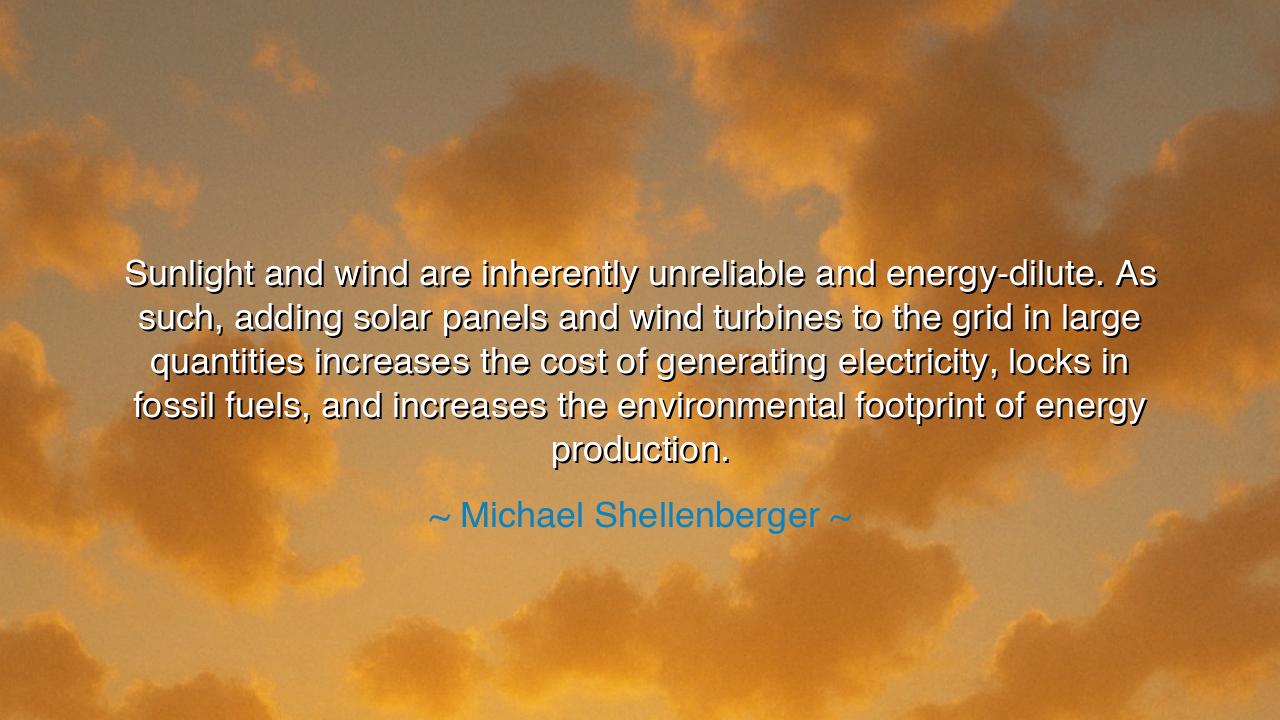
Sunlight and wind are inherently unreliable and energy-dilute. As
Sunlight and wind are inherently unreliable and energy-dilute. As such, adding solar panels and wind turbines to the grid in large quantities increases the cost of generating electricity, locks in fossil fuels, and increases the environmental footprint of energy production.






In the words of Michael Shellenberger: “Sunlight and wind are inherently unreliable and energy-dilute. As such, adding solar panels and wind turbines to the grid in large quantities increases the cost of generating electricity, locks in fossil fuels, and increases the environmental footprint of energy production.” These words are heavy with warning, spoken like those of an elder who has seen folly repeated in many generations. They tell us that not all that glitters with promise is gold, and that even forces as ancient and noble as the sun and the wind may, when harnessed wrongly, bring unintended burdens upon mankind.
The ancients often taught that nature is both friend and foe. The sunlight that warms the earth also scorches it in drought. The wind that fills the sails of ships also wrecks them in storms. Shellenberger points to this duality: that the very forces celebrated as clean and pure are also unstable, and thus cannot be the sole pillars of civilization’s energy. When yoked to the great machinery of the grid, their unreliability demands constant backup, and that backup comes not from gods or dreams, but from the steady fire of fossil fuels.
Consider the tale of Germany in recent years. The nation, in its bold Energiewende, rushed to cover its land with solar panels and wind turbines, believing itself a beacon to the world. Yet when the winds failed or the skies grew dark, coal and imported gas filled the gap. Electricity prices rose among the highest in Europe, and the dream of clean energy became entangled with greater dependence on the very fuels it sought to escape. This is the lesson Shellenberger presses: that by leaning too heavily on the dilute and the unreliable, nations risk binding themselves tighter to the old engines of pollution.
History too offers a mirror. In ancient Rome, leaders built elaborate aqueducts to bring water to the city. But when rivers ran dry or were diverted, chaos struck. The people learned that while water was life, its flow could not be guaranteed without vast and costly backup systems. In the same way, sunlight and wind are gifts of heaven, but their fickleness demands duplication: batteries, gas plants, or coal stations waiting in silence for the moment of weakness. Such duplication is not liberation, but added burden.
The deeper meaning of this quote is a call to discernment. It is not a rejection of renewables, but a warning against blind faith in them. Shellenberger teaches that energy must be judged by its density, its reliability, its ability to sustain civilization without collapse. To ignore these measures is to mistake symbol for substance, to worship the appearance of purity while hiding the reality of greater costs and deeper scars upon the land.
And yet, his words are not merely critical, but instructive. They point us back to the principle that mankind has always advanced by choosing stronger sources of power: from wood to coal, from coal to oil, from oil to nuclear. Each step gave more energy with fewer burdens. To now turn toward the dilute and the uncertain is to walk backward in the march of progress, locking ourselves into weakness while believing we pursue strength.
So let this teaching endure: do not be seduced by the shine of panels or the grace of turbines without first weighing their true worth. Seek energy that is abundant, dense, and reliable, for these are the foundations of civilization. In your own life, look beyond appearances—measure actions by their outcomes, not their intentions. For as Shellenberger reminds us, even the most noble-seeming path may, if chosen without wisdom, lead not to liberation, but to heavier chains.






AAdministratorAdministrator
Welcome, honored guests. Please leave a comment, we will respond soon